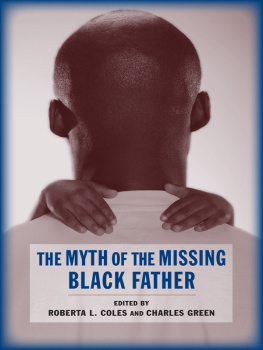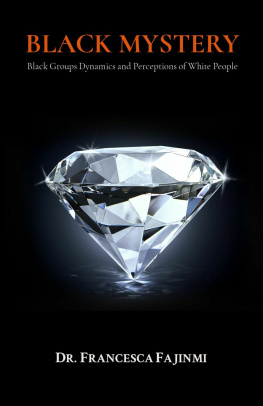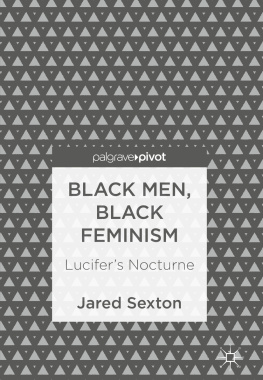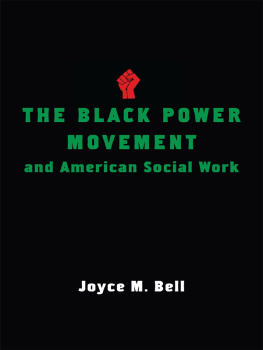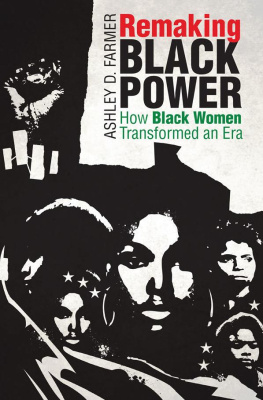FATHERING FROM THE MARGINS
FATHERING FROM THE MARGINS
An Intimate Examination of Black Fatherhood
Aasha M. Abdill
Columbia University Press
New York
Columbia University Press
Publishers Since 1893
New YorkChichester, West Sussex
cup.columbia.edu
Copyright 2018 Columbia University Press
All rights reserved
E-ISBN 978-0-231-54227-2
Library of Congress Cataloging-in-Publication Data
Names: Abdill, Aasha M., author.
Title: Fathering from the margins : an intimate examination of black fatherhood / Aasha M. Abdill.
Description: New York : Columbia University Press, [2018]
Identifiers: LCCN 2017049727 (print) | LCCN 2018011802 (e-book) | ISBN 9780231180023 (hardcover : alk. paper)
Subjects: LCSH: African American fathers.
Classification: LCC HQ756 (e-book) | LCC HQ756 .A23 2018 (print) | DDC 306.874/208996073dc23
LC record available at https://lccn.loc.gov/2017049727
A Columbia University Press E-book.
CUP would be pleased to hear about your reading experience with this e-book at .
Cover design: Milenda Nan Ok Lee
Cover art: Michael Speights
In memory of my father, for all the times he was there.
Dedicated to my mother, for all the times he wasnt.
Contents
To the participants of my study,
Thank you for opening up your world to me. It is my sincerest intention to present it here with the utmost respect and integrity. To the teachers, family workers, custodians, cooks, and other staff at my field site, your perspectives on my topic grounded my work. It was my honor to work alongside you.
To the fathers of Bed-Stuy and similar communities all over the globe,
At its core, Fathering from the Margins concerns the trials, tribulations, triumphs, and transitions that black fathers have experienced, many of which have gone largely unseen and unrecognized. Until the opportunities afforded by society are as plentiful as its expectations and its judgments, see yourselves through the eyes of your children. There is no truer measuring stick.
To Michael,
Thank you for being part of the vanguard. Bali and Mari couldnt be luckier.
To my siblings and my extended family, kin and fictive kin,
I have heard it said that siblings are modified versions of each other. For seven mirrors who understand my virtues and vices, I appreciate every push and pull. Our bonds are our saving grace. Thank you, Yomilove, for being family without the blood and staying ready to spar with me on any topic. To all of my extended family and friends, thank you for your cheers and your check-ins and, especially, the attempts to hide the glazed-over look in your eyes whenever I started to use sociological jargon.
To my advisers and colleagues,
To my first and most influential adviser, Jeannette Abdill, your example of strength and resilience is embedded in my core. It provides the foundation on which all my subsequent schooling rests, both from formal school and from the school of hard knocks. I carry your pride everywhere. To Cynthia Boyce and Eric Smith, the passion and commitment you have for families and fathers in Bed-Stuy is inspiring. To my colleagues in academia, big or small, your time, support, and counsel meant more along this journey than you will ever know. To Sofya Aptekar, your last-minute notes and our friendship based on our commonalities as Brooklyn residents and as mothers at Princeton kept me tethered. To Roberta Coles, thank you for being responsive to a cold email from a researcher you did not know and for encouraging a disconnected academic to publish her book. To Jennifer Perillo, thank you for giving my unsolicited proposal more than a passing glance. Finally, to my former, current, and future colleagues and comrades who do the work every day empowering those living in the margins Till We Get There. In keeping with a theme of my research, let me take the opportunity in these acknowledgments to point out that there is a Dead Prez song of the same title that expresses this sentiment in a way only hip-hop could. To all the hip-hop artists who have shared their intellectual analyses on fatherhood and families through their music, thank you for enriching the scholarship in this area.
At the center of Brooklyns Bedford-Stuyvesant community is the New Bed-Stuy Boxing Center, which has been there ever since I can remember. Although I have peered into its dark interior many times, I have never gone inside. To the eyes of a child, it always seemed private and a little dangerousa place where only men entered. Above the boxing center is a childcare center. Every weekday, little feet run to the entrance at the side of the building to go upstairs to school. Although the boxing and the childcare centers could not be physically closer, the two worlds are far apart socially. Or so we once thought. This book reexamines the perceived distance between two social worlds. One world consists of low-income black men, solitary figures connected only to each other; the other world consists of low-income black children in urban America, fatherless offspring connected primarily to their single mothers.
Over the last fifty years, statistical trends on family structure have corroborated the view that few children in low-income black communities live with their fathers. Indeed, the percentage of children living with fathers has steadily declined since the 1980s (Coles 2009), and though this trend crosses racial and socioeconomic lines, low-income black biological fathers are much less likely to live with their children than are other fathers (Eggebeen 2002). Thus, a snapshot of a low-income black community flooded with fathers accompanied by their children seems paradoxical. Nonetheless, a walk around the Bed-Stuy community today will reveal such a picture.

On any given day in Brooklyns Bedford-Stuyvesant community, an observant walker will pass by men with their children, pushing strollers, holding little hands, or buying chips and a quarter water from the corner store. At first the observer is likely to be slightly surprised as she tries to reconcile this observation with what she has come to believe about black fathers in urban neighborhoodsnamely, that not many of them are involved as parents. Upon asking old men sitting on crates in front of the park, the staff at neighborhood childcare centers, and even the fathers themselves about the increasing presence of fathers in public, she hears, Now that you mention it, I have noticed more men with their children, but
Despite the growing body of evidence in scholarly literature that black men are as likelyand in some cases more likelyto be involved with their children when controlling for residence, the public continues to think of black fathers as absent and uninvolved. In December 2013, a report published by the Centers for Disease Control and Prevention (CDC) based on data from 2006 to 2010 found that involvement of fathers in various childcare activities was similar across races. In certain activities, rates for black fathers rose above those of white and Hispanic fathers. Although the reports leading author played down the higher levels of involvement among black men (Tanner 2013), many newspaper articles and blogs zeroed in on the racial implications of the findings, pointing out that they defied stereotypes. Comments posted by readers in response to the findings were a mixed bag, but many expressed surprise, disbelief, or suspicion regarding the findings. On the other hand, a considerable number of people stated that the study was long overdue and proved what they already knew from personal experience.


